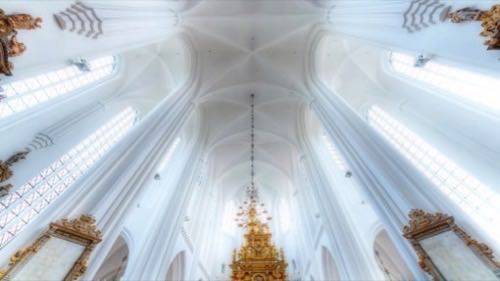The U.S. Constitution, enacted in 1787, guarantees freedom of religion for its citizens. Sweden’s Constitution Act, passed in 1974, grants the same freedom, but having been ratified in the electronic age, explicitly extends the right to express that freedom in “transmissions” and “recordings.” Now a Swedish group is trying to take advantage of the law by declaring file sharing a religion and seeking legal safe harbor by declaring copyright violation a sacrament.

I’m a frequent contributor to the C.S.T. program on Colombia’s news channel NTN24; and yesterday, my producer there asked me to contribute a comment on the subject of the Church of Kopimism. To be completely honest with everyone, I had not heard of it before she shared a link.
The Web site of the international headquarters for the church (kopimistsamfundet) explains the loophole it attempts to exploit this way: Since illicit file sharing may be, in at least one sense, a transgression, the transmission of the knowledge of that transgression may be, at one level, a confession. Thus if the operators of the services receiving such confessions treat them with absolute secrecy (I suppose not all information wants to be free), then those operators are entitled to special protection under Swedish law as priests.
If you’re thinking what I was thinking… well, first of all, shame on you. Second, someone did try to obtain priestly protection for, um, that too, to no avail.
I could stop here and say, “Well, isn’t that just ridiculous” and move on to the next thing to ridicule. But my NTN24 producer knew my background on the blending of technology and religion, and asked me to take it one step further. So I wrote the following few paragraphs, in an essay I presented for C.S.T. host Mónica Fonseca this morning:

First, briefly, allow me to speak as someone involved in the information technology field: There is nothing about copyright violation that can be cleansed and purified by declaring it a religion. I could go next door right now and saw down my neighbor’s trees. If I tell the police I did this in the act of spiritual revelation, that does not somehow make it legal or even right.
As someone who has learned a few things about the law as a journalist, I can say this: In the United States and Canada, and most other countries I can name, you can’t just declare yourself a religion for tax purposes.
Most important – and I hope your viewers will permit me to do this – I should like to speak as a Christian. I find it sad that any group of people should find it necessary to desecrate the beliefs of millions, including myself, simply to justify, in their own minds, a guilty obsession. The Church of Kopimism declares the act of copying and redistributing digital information to be sacrament. If indeed the distribution of digital information is holy, then I would make it my life’s mission to make certain that every act of transmission I made was infused with only the purest wisdom and the greatest knowledge. Somehow, I suspect that what the Kopimists spend their time copying is something less than revelation.
True religion, I believe, should be that which gives you strength and wisdom and power when all else fails. At this moment, there are thousands of Colombians who remain homeless after the waves of devastating floods took all their possessions and some of their family. I sincerely doubt that any of these people today are praying for the return of Megaupload to save them from their misery. Praying for them should not require electricity. God is the source of all power when every other source has failed. I would hate to have to depend for my personal strength upon any power source that a human being or an act of nature can turn off.
Cathedral image courtesy of Shutterstock.

















